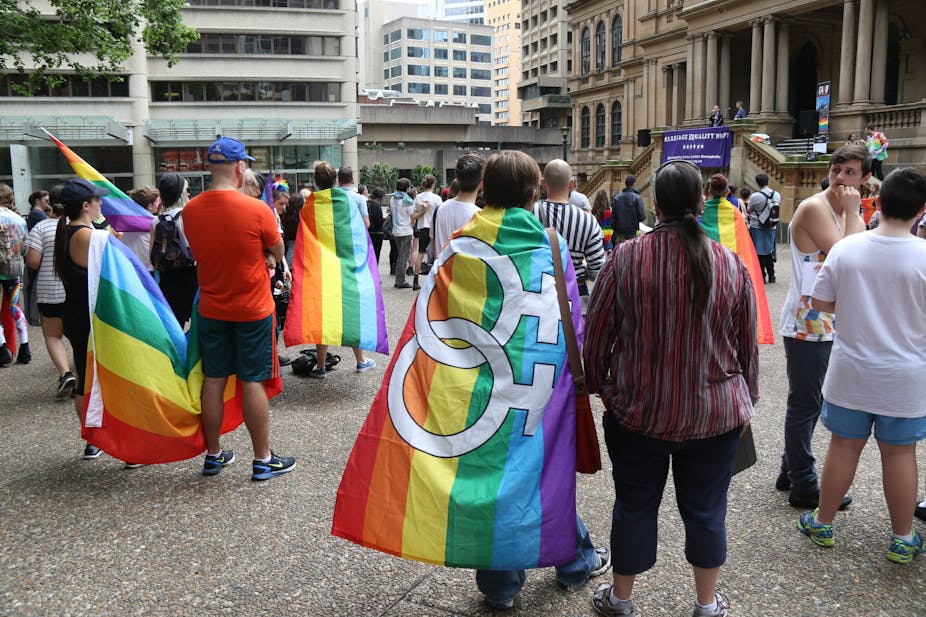The Conversation has asked 20 academics to examine the big ideas facing Australia for the 2016 federal election and beyond. The 20-piece series examines, among others, the state of democracy, health, education, environment, equality, freedom of speech, federation and economic reform.
In recent years, political point scoring and wedge politics have made it hard to have a calm, reasoned political debate on a range of issues from same-sex marriage to refugees or climate change. However, potentially controversial social issues have not always been so hotly contested by the major parties.
Beyond socially divisive politics
In 1972, a Liberal politician, Murray Hill, began the process of decriminalising homosexuality in South Australia, which Labor completed in 1975. He was assisted in drafting his private member’s bill by his lawyer son Robert (later a Howard government minister).
In 1973, former Liberal prime minister John Gorton moved a motion with a Labor colleague, expressing parliament’s support for decriminalising homosexuality.
Admittedly, the 1970s also experienced bitter political battles. The Whitlam government was controversially sacked after the opposition under Malcolm Fraser blocked supply. Nonetheless, some issues were considered too socially divisive to turn into party-political ones.
Immigration had been one such issue since the second world war. Despite his own reservations, Gough Whitlam “did not play politics” with the Fraser Coalition government’s decision to take in large numbers of Vietnamese refugees, including boat people. As Fraser later said:
If instead of this consensus, the disgraceful race to the bottom of the populist political point scoring of recent years had prevailed, the cost to Australia would have been enormous.
The culture wars
The agreement not to use immigration as a party-political issue ended in 1988 with a speech by then Liberal leader John Howard. Later, Howard fostered the “culture wars”: divisive social issues from race and asylum seekers to same-sex marriage were used regularly in attempts to ideologically “wedge” socially conservative Labor voters away from the ALP.
I do not wish to argue that there was some past golden age in which the politics of fear or prejudice were never mobilised for party-political purposes. After all, the Liberals regularly used anti-communist fear campaigns against Labor from the 1940s until well into the 1980s.
In the early 20th century, Labor regularly mobilised racial fears, suggesting its opponents were soft on the White Australia Policy. Arguably, then-prime minister Julia Gillard took a leaf out of Howard’s old campaign book and dog-whistled on reducing immigration in the 2010 election.
Nor do the major parties always disagree. A significant number of bills still get through parliament with the support of both major parties (though the considered debate and lack of conflict reduce a sensationalist, 24/7 media’s coverage of them).
Furthermore, the major parties have made important attempts at negotiation on contentious issues. As opposition leader, Malcolm Turnbull reached an agreement with then climate change minister Penny Wong on a revised carbon emissions trading scheme (the CPRS).
However, Tony Abbott used Turnbull’s support for the scheme to oust him from the Liberal leadership, mobilising public fears that the CPRS was a big green tax that would destroy Australian industry. Two Liberal senators crossed the floor to vote for the CPRS, but the Greens helped vote it down. Climate change, one of the most important issues of the age, became a party-political (and intra-party) football.
Furthermore, all too often in recent years, a “culture war” politics of fear and anxiety has been used against vulnerable minorities for populist party-political purposes. Same-sex marriage and the Safe Schools program, designed to counter homophobic bullying, are arguably cases in point.
Recently, Education Minister Simon Birmingham has been pressured to introduce significant changes to the Safe Schools program. These go far beyond the recommendations of an independent review.
The cross-party leadership on same-sex issues displayed years ago by Liberals Murray Hill and John Gorton (or more recently by conservative prime ministers David Cameron in Britain and John Key in New Zealand) has not proved possible. Rather than leaving it to parliament to decide on same-sex marriage, Turnbull has been pressured by conservative forces in his party to accept a potentially abusive and divisive plebiscite – a process that he originally opposed.
Given that loving same-sex relationships have been constructed, well within living memory, as not only sinful but illegal, and as evidence of a psychiatric illness, it is not surprising that same-sex couples fear that many plebiscite arguments against their marrying will draw on outdated prejudices rather than reasoned debate.
Getting the balance right
Politicians do have genuine, heartfelt, ideological differences over what is best for society.
However, politicians can also encourage fear and discriminatory attitudes for party-political (or even inner party factional) purposes without sufficient concern for the impact on broader Australian society or vulnerable minorities.
At its best, adversarial party politics fosters crucial debates and expands the democratic choice for voters. At its worst, it mobilises prejudice and undermines the possibility of parties working together for the common good. The question is whether we have the balance right.
You can read other articles in the series here.

